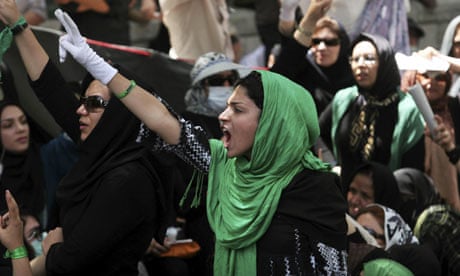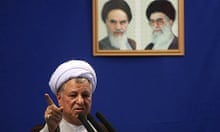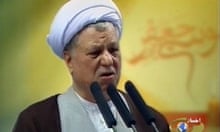Iranian riot police used batons and teargas today to break up defiant protests after prayers in Tehran, where Hashemi Rafsanjani, one of the country's most powerful clerics, warned that the regime was "in crisis" and urged a release of prisoners detained in post-election unrest.
Rafsanjani, a bitter rival of the supreme leader, Ayatollah Ali Khamenei, broke his month-long silence to issue a stark warning that the Islamic Republic had lost popular support. His carefully crafted address stopped short of directly attacking Khamenei or Mahmoud Ahmadinejad, whose victory in June's presidential poll has been widely denounced as a fraud. But its message was still strong.
"Today is a bitter day," Rafsanjani declared from the pulpit at Tehran University's sprawling prayer ground. "People have lost their faith in the regime and their trust is damaged. It's necessary to regain people's consent and restore their trust in the regime. Everyone has lost."
Mir Hossein Mousavi, the moderate former prime minister who says he won the election, sat in the front row with other VIPs as Rafsanjani spoke. Mehdi Karoubi, a reformist cleric who was also a candidate, was there too — and was jostled by thugs afterwards.
Mousavi and Karoubi both insist the Ahmadinejad government is illegitimate. Khamenei has publicly backed the incumbent, hoping to see off the biggest challenge to the regime since the Iranian revolution 30 years ago.
Tens of thousands of Mousavi supporters, many wearing the green wristbands that became the symbol of his election campaign, packed the prayer ground, the stage for a peculiarly Iranian combination of religion and politics, prayer and agitprop. Rafsanjani's first sermon since the disputed election was keenly awaited but was not broadcast on state TV. Foreign media access is now severely restricted. The mobile phone network was again completely blocked to disrupt communications between demonstrators .
"Doubt has been created [about the results]," Rafsanjani said. "There is a large portion of wise people who say they have doubts. We need to take action to remove this doubt. Where people are not present or their vote is not considered, that government is not Islamic."
This passage needed little decoding: Khamenei and the guardian council, a clerical body which supervises elections, have declared the contest free and fair, dashing hopes of a re-run. Still, Rafsanjani – often accused of sitting on the fence – did not call outright for an annulment.
His words were repeatedly interrupted by slogans from the rival camps as well as by whiffs of teargas fired by security forces and which drifted in from the surrounding streets. Hardliners chanted the traditional "death to America" while opposition supporters countered with azadi (freedom) as well as "death to Russia" – a reference to the government's ties to Moscow.
The chanting died away only after the speaker urged the crowd "not to contaminate the position and the sanctuary of Friday prayers". Rafsanjani wept as he spoke of prisoners, and of the Prophet Muhammad as one who brought justice, and a man who "protected the rights of all those under his rule" – more thinly-veiled criticism of the government.
"Rafsanjani's main message was for Ayatollah Khamenei," said the analyst Baqer Moin. "Rafsanjani wanted to tell him, 'You'd better be humble and try to find a way out of the current crisis.'"
The crowd at Friday prayers is usually made up extremely conservative government loyalists. But many Mousavi supporters were young women wearing the loose hijab head-covering shunned by the devout. Some had green-painted fingernails.
"This was not a normal Friday prayer," said Fariba, a 24-year-old student. "The regime has killed people and we have got more united. They have not silenced us. Ironically, I thank Ahmadinejad for making us unite against him."
The crackdown on the media was only partially effective. An unprecedented number of videos posted on YouTube on a single day showed masked protesters starting fires in the streets, or handing out flowers to policemen.
Teargas was fired at Mousavi supporters on their way to prayer but clashes with police and basij militia intensified afterwards. At least 20 people were arrested, witnesses said. Among those detained was Shadi Sadr, the prominent women's activist and human rights lawyer.


